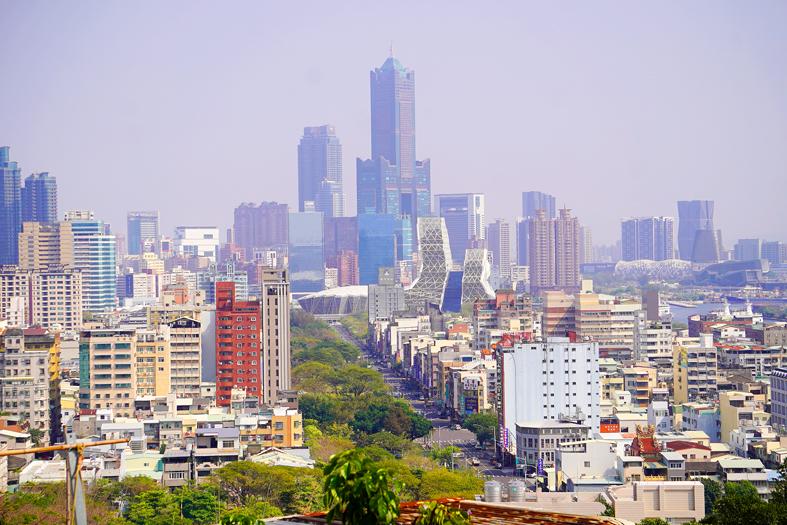Combined property tax revenue in the first quarter of the year soared nearly twofold annually to a new high of NT$7.29 billion (US$249.78 million), more than the sum of the previous five years, due to steep hikes in housing prices and active transactions, Sinyi Realty Inc (信義房屋) said.
The sharp gain in property tax revenue — also known as integrated house and land sales tax — mocked a spate of unfavorable policy measures introduced by the government to induce a soft landing for housing prices, the nation’s sole listed broker said in a news release on Thursday.
Taichung’s property tax revenue increased 62 percent year-on-year to NT$1.55 billion, making the special municipality the largest contributor of property taxes in the country, Sinyi research manager Tseng Ching-der (曾敬德) said.

Photo: CNA
New Taipei City ranked second with NT$1.02 billion in property tax revenue, more than doubling the NT$480 million it recorded a year earlier, Sinyi said, citing government data.
If unfavorable measures worked, property transactions and property tax revenue would have declined, Tseng said, adding that when property gains outpace tax burden increases, people make transactions.
Kaohsiung placed third, contributing NT$9.4 billion in property tax revenue, a 99 percent increase from a year earlier, Sinyi said.
Property tax revenue in Taipei rose 87 percent to NT$840 million, jumped 182 percent in Taoyuan to NT$810 million, while Tainan generated NT$640 million of property tax revenue, an 89 percent increase from a year earlier.
Property tax revenue spiked 480 percent to NT$370 million in Hsinchu County and increased 145 percent to NT$250 million in Hsinchu City.
The extension of property taxes to presale contract transfers also helped drive up overall property taxes, Tseng said.

NEW IDENTITY: Known for its software, India has expanded into hardware, with its semiconductor industry growing from US$38bn in 2023 to US$45bn to US$50bn India on Saturday inaugurated its first semiconductor assembly and test facility, a milestone in the government’s push to reduce dependence on foreign chipmakers and stake a claim in a sector dominated by China. Indian Prime Minister Narendra Modi opened US firm Micron Technology Inc’s semiconductor assembly, test and packaging unit in his home state of Gujarat, hailing the “dawn of a new era” for India’s technology ambitions. “When young Indians look back in the future, they will see this decade as the turning point in our tech future,” Modi told the event, which was broadcast on his YouTube channel. The plant would convert

‘SEISMIC SHIFT’: The researcher forecast there would be about 1.1 billion mobile shipments this year, down from 1.26 billion the prior year and erasing years of gains The global smartphone market is expected to contract 12.9 percent this year due to the unprecedented memorychip shortage, marking “a crisis like no other,” researcher International Data Corp (IDC) said. The new forecast, a dramatic revision down from earlier estimates, gives the latest accounting of the ongoing memory crunch that is affecting every corner of the electronics industry. The demand for advanced memory to power artificial intelligence (AI) tasks has drained global supply until well into next year and jeopardizes the business model of many smartphone makers. IDC forecast about 1.1 billion mobile shipments this year, down from 1.26 billion the prior

People stand in a Pokemon store in Tokyo on Thursday. One of the world highest-grossing franchises is celebrated its 30th anniversary yesterday.

Zimbabwe’s ban on raw lithium exports is forcing Chinese miners to rethink their strategy, speeding up plans to process the metal locally instead of shipping it to China’s vast rechargeable battery industry. The country is Africa’s largest lithium producer and has one of the world’s largest reserves, according to the US Geological Survey (USGS). Zimbabwe already banned the export of lithium ore in 2022 and last year announced it would halt exports of lithium concentrates from January next year. However, on Wednesday it imposed the ban with immediate effect, leaving unclear what the lithium mining sector would do in the